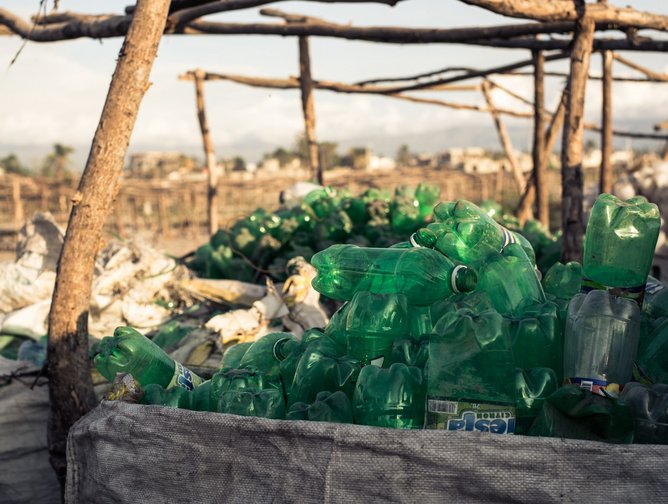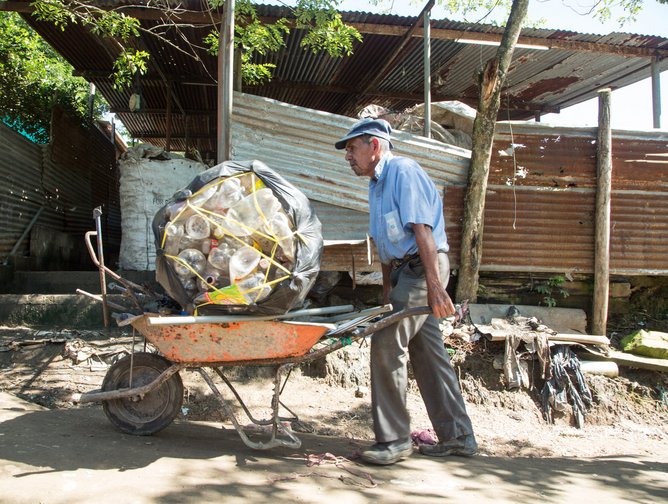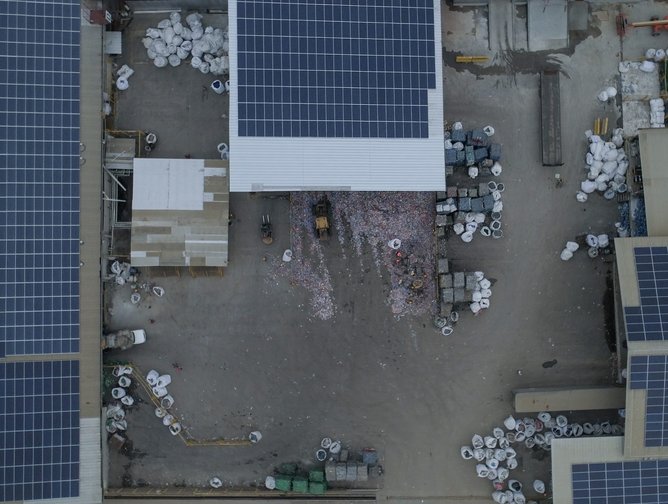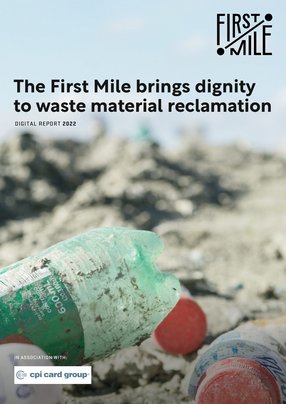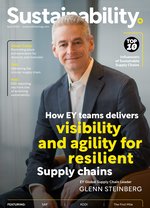The First Mile brings dignity to waste material reclamation
Kelsey Halling is Head of Partnerships at The First Mile, and Vivien Luk Executive Director at WORK. They work closely together on projects in Haiti and subsistence communities in other parts of the world, currently mainly Taiwan and Honduras. The First Mile is a private non-profit partnership between Thread and WORK. It focuses on finding and ameliorating human rights concerns within the raw material sourcing of supply chains, improving quality and volume of material collected and supplied to brands. They are expanding their work this year exploring the creation of new First Mile supply chains and launching programmes in Brazil, Indonesia, Vietnam, Ghana and some USA states. “We're hoping to expand our work globally, wherever the need is greatest,” says Kelsey Halling.
The brands that work with The First Mile in making their supply chain more sustainable include FMCG brands such as Heineken & Unilever, technology giants like Hewlett Packard, Fashion brands like Puma and Ralph Lauren, and credit card companies such as CPI and US Bank. These are the sectors First Mile can make the biggest impact supporting brands within, providing huge opportunities for plastic recycling and social impact but there can be very few businesses these days that would not like to increase their recycling credentials both in-house and in their supply chain.
The human cost
Developed countries tend to have established, professionally run waste collection facilities, usually with arrangements for recycling, whereas in the global south there may be little or no such infrastructure. But there's just as great a supply of waste material. “The way recycled materials, and plastic specifically, get to recycling facilities in the first place is because individuals are sorting this material from the general waste stream and selling it to give them some income.”
This is an efficient business model for informal waste collectors, with a low barrier to entry, formalizing the work they already do in sourcing recyclable materials (often in hazardous locations and open to exploitation, child labour that takes children's education away, and other human rights issues – issues that global brands really don't want associated with their supply chain. “If we can bring, safety and dignity to this work and recognise the critical service that informal waste collectors are providing, not only from the environmental standpoint of keeping this material from being burned, buried or reaching our oceans but also addressing the social impacts too, then our brands can tell a very different, holistic and powerful story.”
Halling works very closely with Vivien Luk. “WORK's mission is to accompany families out of poverty through good dignified jobs,” she explains. “Haiti has no waste infrastructure – everything is dumped in landfill, in canals or in the street or into the sea. People will pick it up only if it has a value. Oftentimes in a place like Haiti people actually live on those landfills because it's affordable for them, gets them away from violent neighbourhoods and selling what they collect on the same spot brings them some money. When we did our initial assessment to understand who they are, what their needs are, their assets, we found families of about six, with children some four years behind in their schooling and dropping out of school around the age of ten. The parents too tend to have ceased education at the same kind of age, so are unable to bring in more than a subsistence income of maybe $30 a month. They can't afford to send their kids to school, which is why we find those children working on landfills simply to put food on the table.”
With Hewlett Packard (HP), one of First Mile's biggest brand partners, a programme was initiated in 2016 to put an end to child labour at Haiti's largest landfill site near its capital Port au Prince. Since then other partners including fashion brand PUMA and CPI Card Group have joined in supporting the work, with the result that already some 75% of children working there have returned to school and other learning opportunities, removing themselves from working in waste collection. Furthermore, access to medical care, health information and workshops, together with prevention programming, has led to a significant decrease in emergencies. “We believe in a holistic model of accompanying the whole family by ensuring that they have a safe roof over their heads and access to educational opportunities. Poverty in Haiti has multiple causes but a key remedy is dignified work, so we create a vibrant market for the supplies they're collecting on a day-to-day basis: so not only have our brand partners supported our social impact programming, but they have also allowed us to grow demand for the supplies that are being collected and increase their value as time goes on.”
Good for people, good for the planet
For communities subsisting on landfill because it's their only way to stay alive, the money they can make is a higher priority than global warming, but these are usually the very communities most impacted by rising sea levels, the loss of species they may rely on for food, and the frequency of extreme weather events. They are less likely to follow the deliberations of COP26, but they, and the service they provide to the recycling industry, are important in solving the issues that are being discussed there.
In the past, businesses have fallen into the trap of treating sustainability as solely a CSR issue, and have addressed it only because of the wish to tell a good story to their shareholders in the Annual Report. In short, greenwash. As for climate change, until recently, some were unsure whether, if it existed at all, really felt this was a compliance issue and waited for government regulations to catch up. Today change is being driven at the grass roots level, the employees and the supply chain, and at last being taken seriously at board level. “Though the work we do is clearly human-centred and focused, Halling emphasises, “ it also drives business performance. Investing in the human rights of raw materials collectors in the first mile means greater quantity and higher quality of recycled material for our brands. I think we're getting to a point where this isn't just a nice-to-have, but a part of core business strategy.”
To this Vivien Luk gives passionate endorsement. “They are all sitting at COP26 and trying to come up with solutions. These individuals are already on the ground, solving the problem in the real world. Either we get behind them and support them and their work, making it secure and dignified or we continue to spend millions and trillions of dollars on solutions that are not going to yield the outcomes that these global brands, are trying to reach. By partnering with us they know that their dollars are always going to be put behind the collectors network.”
Technology at ground level
The ability to communicate quickly, easily and globally has made a big difference to the effectiveness of the impact team and managers at First Mile, but technology is making things a lot easier for the collectors too, particularly in the rapid growth of mobile money transactions, that enable faster, secure payment by the recycling centre owners to the families that collect the material, allowing First Mile to make relief payments during the pandemic. It is a necessary step to making informal waste collectors become entrepreneurs.
But in this context technology can be a two-edged sword. “ I do think that there is often almost too much faith put in technology as a traceability or solutions-oriented tool,” says Halling, “especially in supply chain management at this level. When people are picking up plastic waste and earning $3 a day, it is going to require some incentive for them to share their personal data. I would like to see the technology tools that do exist out there, do more than point out problems or issues in the supply chain and do more to actually drive solutions. We see a disconnect there with many of the tools and platforms that are available.”
It's a matter of balance, they insist. Technology developed for the supply chain aims to make it efficient, and that's an aim both Kelsey Halling and Vivien Luk support, so long as the process is inclusive of waste collectors and allows them to share their expertise. It may be that one day waste collection will evolve to a point where the informal collectors of Haiti, Taiwan, Honduras and elsewhere are no longer needed, and that is a result The First Mile would be happy with, as long as enough has been done to ensure they have been part of that evolution. “Inclusiveness is a crucial principle we want everyone to take away as they're thinking about technology at the first mile.”
